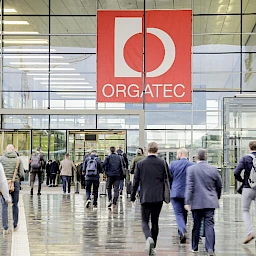Zuzana Blazek, senior researcher at the Institute of the German Economy in Cologne and expert at the Competence Centre for Securing Skilled Labour (KOFA), spoke at ORGATEC about resilience in everyday working life and how we can prepare for an unpredictable future. Reason for IBA Forum to talk to her again.
Ms Blazek, the world of work is characterised by change, speed and complexity. At the same time, there is a lot of discussion about resilience. How do you assess the situation? Do we need psychological resilience that much more than before?
We are currently in a special situation: we have been catapulted into a pandemic, followed seamlessly by the Ukraine crisis, and in parallel to all of this we are confronted with the climate crisis – major and unpredictable threats at breakneck speed. Yet our world has already changed massively before Corona, think of globalisation and digitalisation. As human beings, these changes are very demanding: in our private lives, but also in the world of work. These challenges require new concepts, processes and strategies. When I talk to companies, I get more and more feedback that their biggest challenge at the moment is the psychological strain on their employees and especially their managers. Therefore: Yes, we need to focus more on the human factor in companies and, yes, we need a lot more resilience in the current very challenging situation, and that at all hierarchical levels.
Can resilience be learned? And who do you see as being responsible here, rather the employers or the employees themselves?
I wouldn’t say that you can learn resilience in the classical way. But resilience can be trained. And this is independent of the age and degree of resilience with which every individual is equipped. Everyone can work on their resilience, train it and consequently strengthen it. It should be in everyone’s interest, employers and employees, to do something to improve mental resilience. Companies should take advantage of the fact that resilience can be trained and integrate resilience training firmly into their healthcare management. However, such training is not done with just one workshop. It is about continuous work on oneself and only works with inner readiness and time. Ideally, in addition to the training, employees are supported by a skilled coach, who helps them work on their personal resilience.
So, how could that look like?
There are different ways to approach resilience. It is important to actively communicate the topic in the company, to explain what it means and what it benefits each individual to deal with this topic. I recommend to companies that management and executives should lead as role models. They can show how beneficial it is to participate in resilience training. This reduces any reservations or anxieties that employees may have about participating themselves. However, employees who work on their individual resilience are only one aspect. In order to ensure that they can work effectively, healthily and with motivation in organisations, the framework conditions in the company must also be suitable – i.e. it is necessary to build up resilience-promoting structures in the organisations in parallel. Because if there is a lack of appreciation, good communication, freedom and trust, and if there is also a lack of guiding principles, shared values, an open culture of mistakes and learning, it is almost impossible for individuals to work in a healthy and resilient way.
Please also read

To what extent can corporate culture promote resilience?
The two go together. Many of the aspects I have just mentioned are part of corporate culture: How do we communicate? How do we deal with each other? What are our values and guiding principles? Where do we want to go? How do we deal with mistakes in the company? All of this is corporate culture. It is important to know that managers play a central role in shaping corporate culture. They contribute enormously to whether a company remains competitive, can retain and motivate employees and, overall, enters the future as a resilient company.
In hybrid work scenarios, it is becoming increasingly difficult and at the same time more important for companies to retain their employees. Do you have a recommendation for employers and managers?
We are becoming more and more digital. It is important that managers develop the ability to recognise just how much and what needs to take place online or offline. For employee loyalty, it is important that work does not take place exclusively digitally, but that the office becomes a kind of solid docking station where employees can regularly experience corporate culture and recharge their batteries. A kind of experiential space where you can be social with colleagues and generate ideas as a team. In the future, we will need empathetic managers who have good social skills, are strong communicators and lead employees according to their individual needs. The manager therefore plays a key role in employee retention. It’s no coincidence that people say “You come for the job, you go for the boss”. By the way, satisfied employees are also the most effective way to recruit new employees! Employee retention is therefore a double investment and more important than ever in times of a shortage of qualified staff and a higher willingness to change jobs.
Which skills do managers need to acquire in order to build inner strength for themselves in future change processes?
Above all, managers must learn to practice sufficient self-care. And not only that: setting an example of boundaries and conscious time-outs is the best role model for employees. Furthermore, managers must have the courage to actively demand that their companies allow them to take care of themselves, their personal resilience and their own resources. It is precisely the high relevance and new role of the manager as an empathic employee coach that makes self-care so important. Only those who take care of themselves can work in a healthy, efficient and motivated way and also take care of the well-being of others.
Ms Blazek, thank you for the interview.






